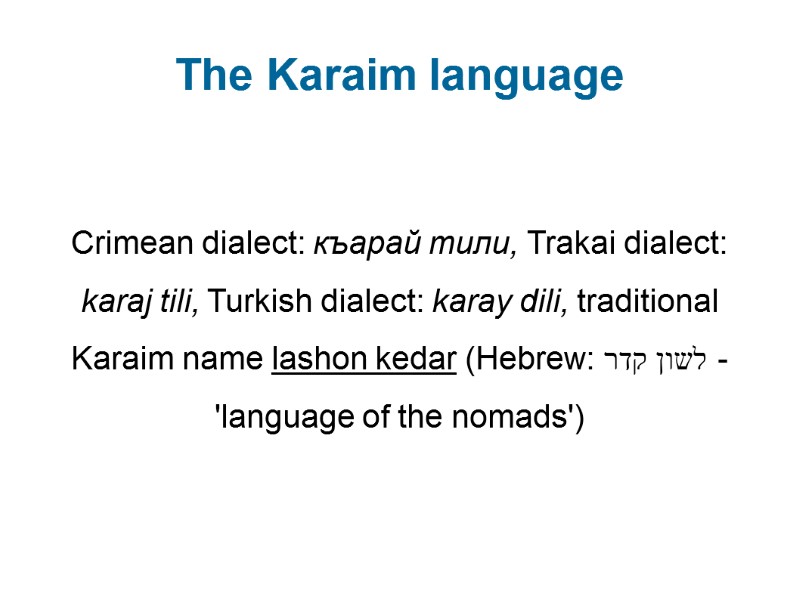 The Karaim language Crimean dialect: къарай тили, Trakai dialect: karaj tili, Turkish dialect: karay dili, traditional Karaim name lashon kedar (Hebrew: לשון קדר - 'language of the nomads')
The Karaim language Crimean dialect: къарай тили, Trakai dialect: karaj tili, Turkish dialect: karay dili, traditional Karaim name lashon kedar (Hebrew: לשון קדר - 'language of the nomads')
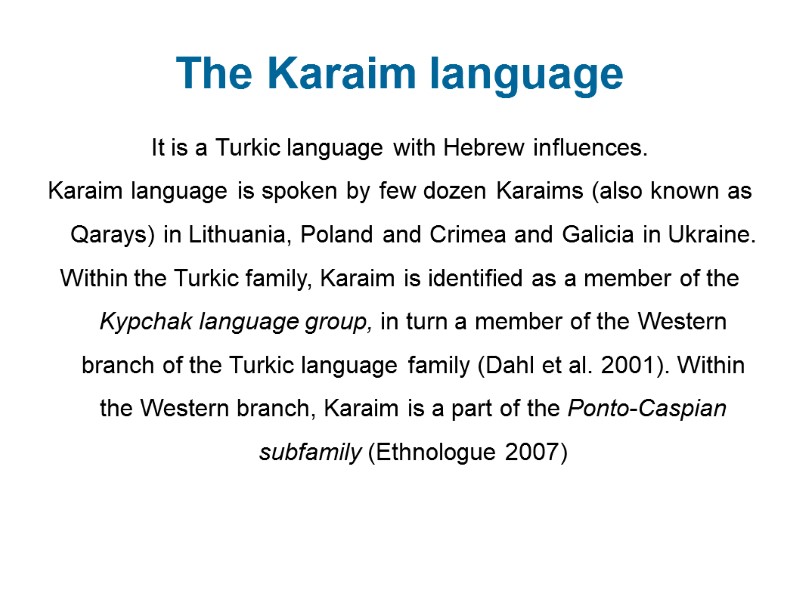 The Karaim language It is a Turkic language with Hebrew influences. Karaim language is spoken by few dozen Karaims (also known as Qarays) in Lithuania, Poland and Crimea and Galicia in Ukraine. Within the Turkic family, Karaim is identified as a member of the Kypchak language group, in turn a member of the Western branch of the Turkic language family (Dahl et al. 2001). Within the Western branch, Karaim is a part of the Ponto-Caspian subfamily (Ethnologue 2007)
The Karaim language It is a Turkic language with Hebrew influences. Karaim language is spoken by few dozen Karaims (also known as Qarays) in Lithuania, Poland and Crimea and Galicia in Ukraine. Within the Turkic family, Karaim is identified as a member of the Kypchak language group, in turn a member of the Western branch of the Turkic language family (Dahl et al. 2001). Within the Western branch, Karaim is a part of the Ponto-Caspian subfamily (Ethnologue 2007)
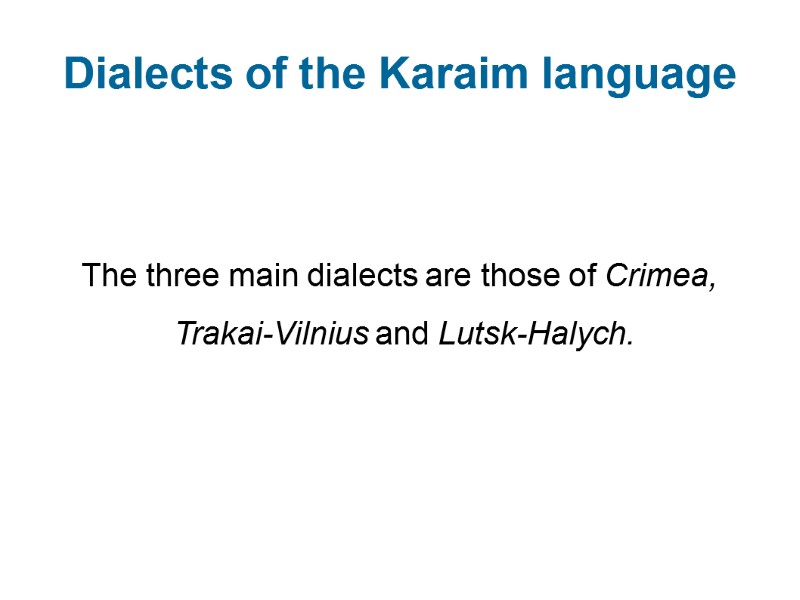 Dialects of the Karaim language The three main dialects are those of Crimea, Trakai-Vilnius and Lutsk-Halych.
Dialects of the Karaim language The three main dialects are those of Crimea, Trakai-Vilnius and Lutsk-Halych.
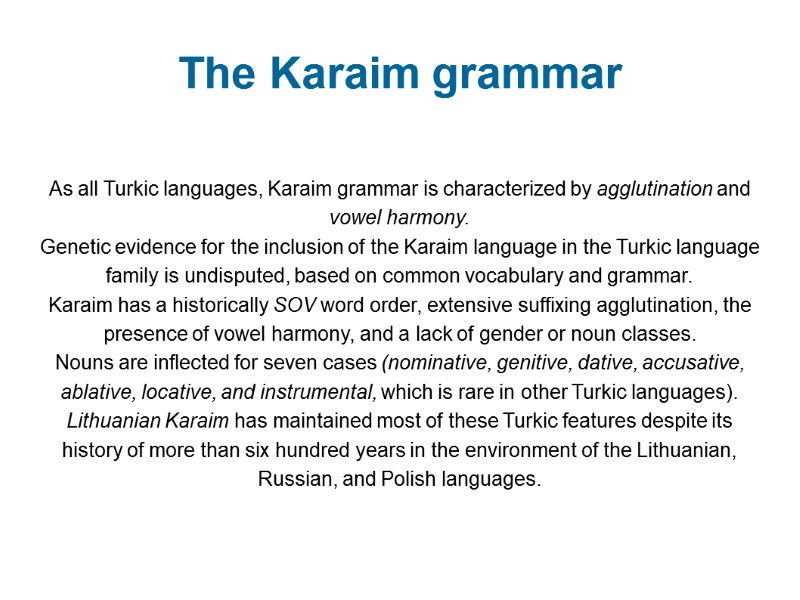 The Karaim grammar As all Turkic languages, Karaim grammar is characterized by agglutination and vowel harmony. Genetic evidence for the inclusion of the Karaim language in the Turkic language family is undisputed, based on common vocabulary and grammar. Karaim has a historically SOV word order, extensive suffixing agglutination, the presence of vowel harmony, and a lack of gender or noun classes. Nouns are inflected for seven cases (nominative, genitive, dative, accusative, ablative, locative, and instrumental, which is rare in other Turkic languages). Lithuanian Karaim has maintained most of these Turkic features despite its history of more than six hundred years in the environment of the Lithuanian, Russian, and Polish languages.
The Karaim grammar As all Turkic languages, Karaim grammar is characterized by agglutination and vowel harmony. Genetic evidence for the inclusion of the Karaim language in the Turkic language family is undisputed, based on common vocabulary and grammar. Karaim has a historically SOV word order, extensive suffixing agglutination, the presence of vowel harmony, and a lack of gender or noun classes. Nouns are inflected for seven cases (nominative, genitive, dative, accusative, ablative, locative, and instrumental, which is rare in other Turkic languages). Lithuanian Karaim has maintained most of these Turkic features despite its history of more than six hundred years in the environment of the Lithuanian, Russian, and Polish languages.
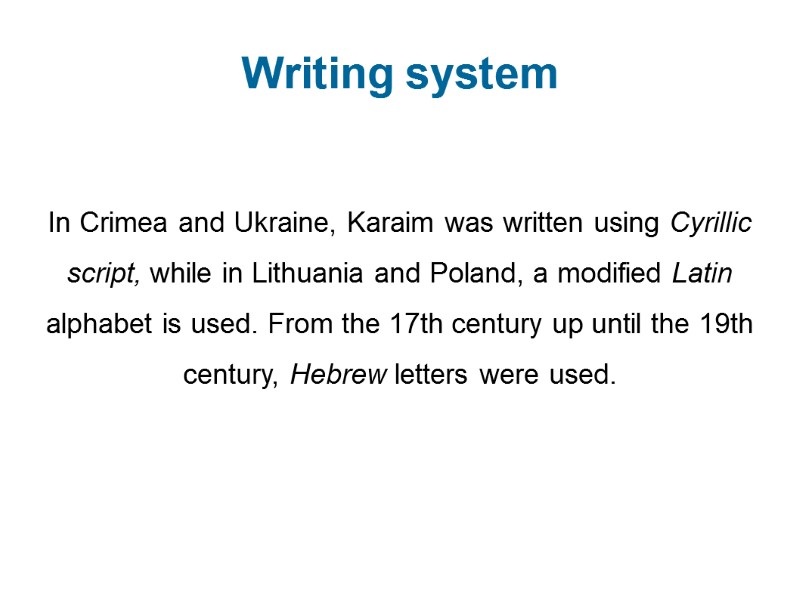 Writing system In Crimea and Ukraine, Karaim was written using Cyrillic script, while in Lithuania and Poland, a modified Latin alphabet is used. From the 17th century up until the 19th century, Hebrew letters were used.
Writing system In Crimea and Ukraine, Karaim was written using Cyrillic script, while in Lithuania and Poland, a modified Latin alphabet is used. From the 17th century up until the 19th century, Hebrew letters were used.
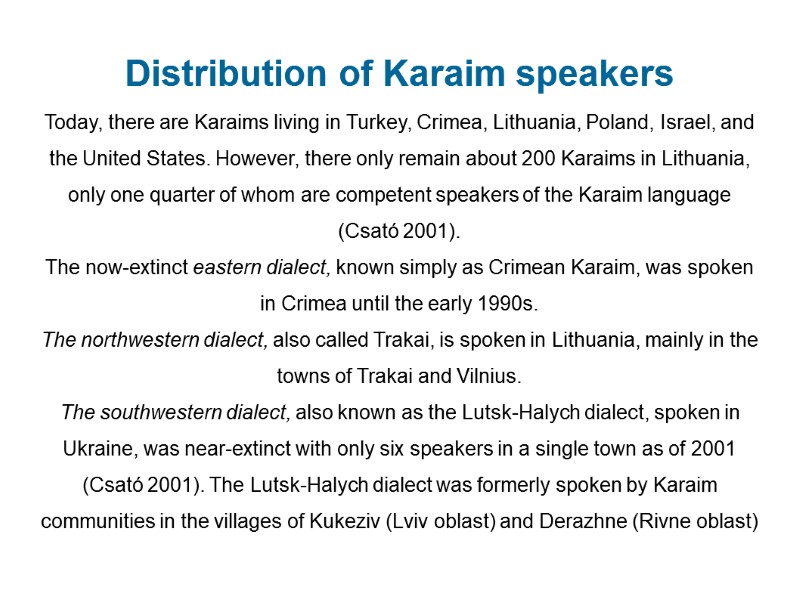 Distribution of Karaim speakers Today, there are Karaims living in Turkey, Crimea, Lithuania, Poland, Israel, and the United States. However, there only remain about 200 Karaims in Lithuania, only one quarter of whom are competent speakers of the Karaim language (Csató 2001). The now-extinct eastern dialect, known simply as Crimean Karaim, was spoken in Crimea until the early 1990s. The northwestern dialect, also called Trakai, is spoken in Lithuania, mainly in the towns of Trakai and Vilnius. The southwestern dialect, also known as the Lutsk-Halych dialect, spoken in Ukraine, was near-extinct with only six speakers in a single town as of 2001 (Csató 2001). The Lutsk-Halych dialect was formerly spoken by Karaim communities in the villages of Kukeziv (Lviv oblast) and Derazhne (Rivne oblast)
Distribution of Karaim speakers Today, there are Karaims living in Turkey, Crimea, Lithuania, Poland, Israel, and the United States. However, there only remain about 200 Karaims in Lithuania, only one quarter of whom are competent speakers of the Karaim language (Csató 2001). The now-extinct eastern dialect, known simply as Crimean Karaim, was spoken in Crimea until the early 1990s. The northwestern dialect, also called Trakai, is spoken in Lithuania, mainly in the towns of Trakai and Vilnius. The southwestern dialect, also known as the Lutsk-Halych dialect, spoken in Ukraine, was near-extinct with only six speakers in a single town as of 2001 (Csató 2001). The Lutsk-Halych dialect was formerly spoken by Karaim communities in the villages of Kukeziv (Lviv oblast) and Derazhne (Rivne oblast)
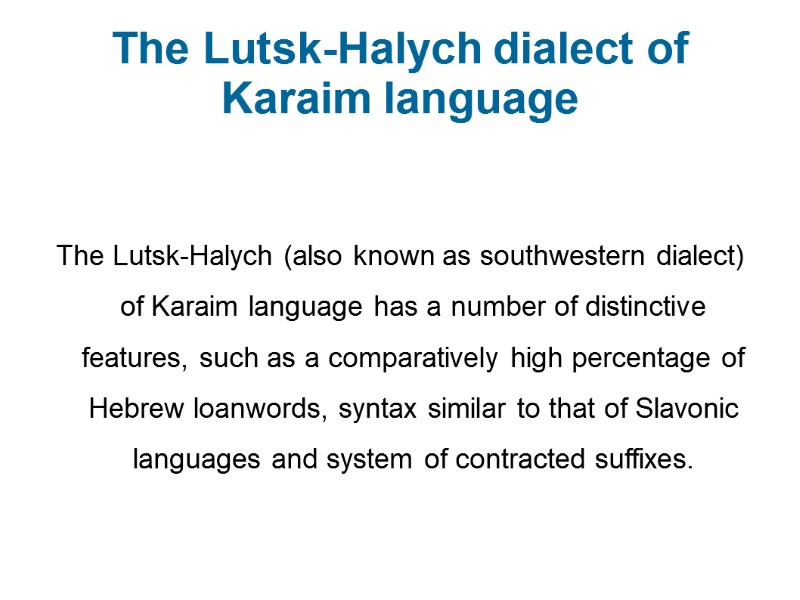 The Lutsk-Halych dialect of Karaim language The Lutsk-Halych (also known as southwestern dialect) of Karaim language has a number of distinctive features, such as a comparatively high percentage of Hebrew loanwords, syntax similar to that of Slavonic languages and system of contracted suffixes.
The Lutsk-Halych dialect of Karaim language The Lutsk-Halych (also known as southwestern dialect) of Karaim language has a number of distinctive features, such as a comparatively high percentage of Hebrew loanwords, syntax similar to that of Slavonic languages and system of contracted suffixes.
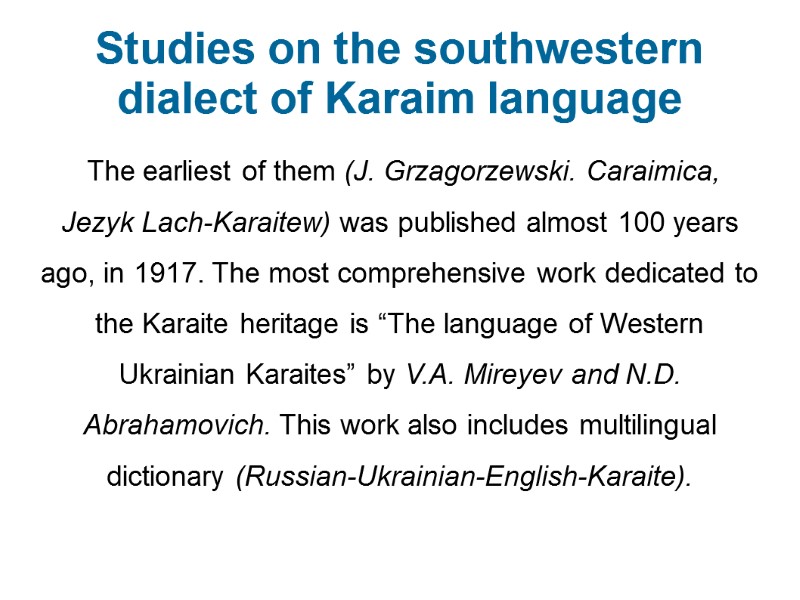 Studies on the southwestern dialect of Karaim language The earliest of them (J. Grzagorzewski. Caraimica, Jezyk Lach-Karaitew) was published almost 100 years ago, in 1917. The most comprehensive work dedicated to the Karaite heritage is “The language of Western Ukrainian Karaites” by V.A. Mireyev and N.D. Abrahamovich. This work also includes multilingual dictionary (Russian-Ukrainian-English-Karaite).
Studies on the southwestern dialect of Karaim language The earliest of them (J. Grzagorzewski. Caraimica, Jezyk Lach-Karaitew) was published almost 100 years ago, in 1917. The most comprehensive work dedicated to the Karaite heritage is “The language of Western Ukrainian Karaites” by V.A. Mireyev and N.D. Abrahamovich. This work also includes multilingual dictionary (Russian-Ukrainian-English-Karaite).
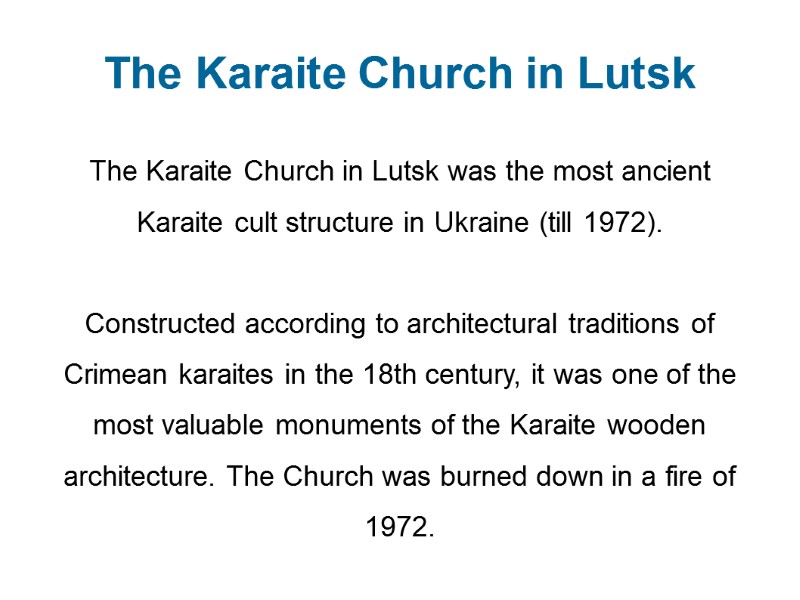 The Karaite Church in Lutsk The Karaite Church in Lutsk was the most ancient Karaite cult structure in Ukraine (till 1972). Constructed according to architectural traditions of Crimean karaites in the 18th century, it was one of the most valuable monuments of the Karaite wooden architecture. The Church was burned down in a fire of 1972.
The Karaite Church in Lutsk The Karaite Church in Lutsk was the most ancient Karaite cult structure in Ukraine (till 1972). Constructed according to architectural traditions of Crimean karaites in the 18th century, it was one of the most valuable monuments of the Karaite wooden architecture. The Church was burned down in a fire of 1972.
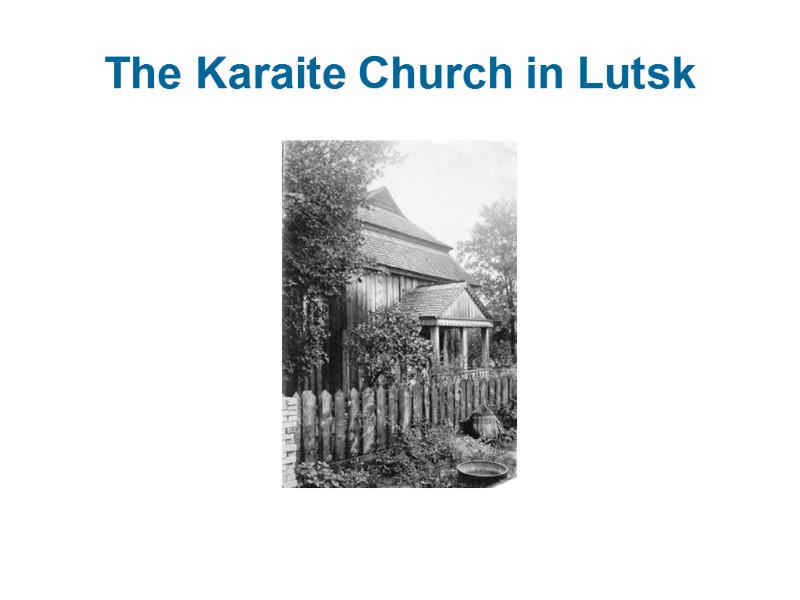 The Karaite Church in Lutsk
The Karaite Church in Lutsk
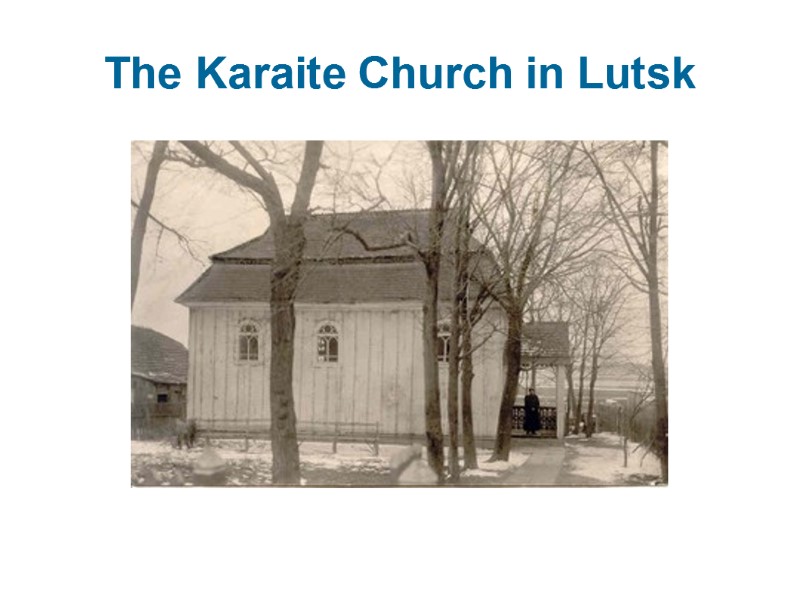 The Karaite Church in Lutsk
The Karaite Church in Lutsk
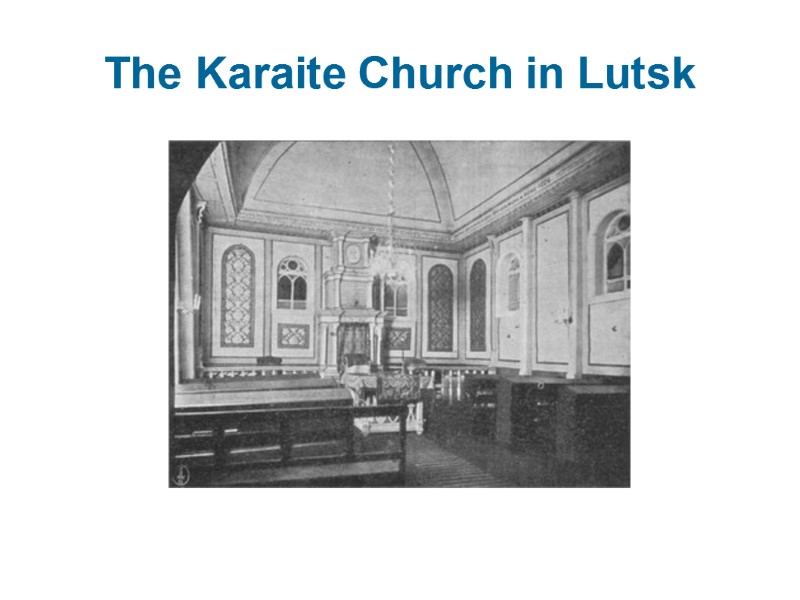 The Karaite Church in Lutsk
The Karaite Church in Lutsk



























